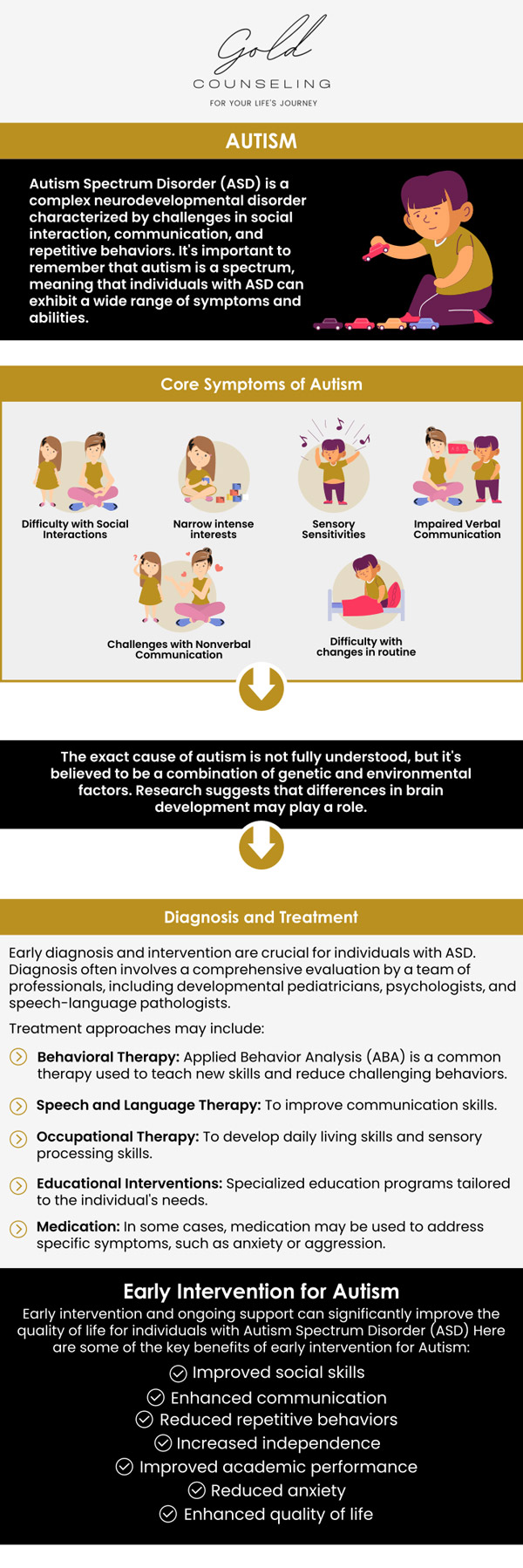Can Autism Behavioral Therapy really help? Find out how
Can Autism Behavioral Therapy really help? Find out how
Blog Article
Secret Signs and Symptoms to Recognize in People With Behavior Autism
When you encounter somebody with behavioral autism, recognizing key symptoms and signs is necessary. You might notice challenges in social interactions and interaction, along with a strong need for routines. Furthermore, sensory level of sensitivities can lead to overwhelming experiences. Understanding these qualities can boost your assistance and treatments, yet there's more to reveal regarding how these habits show up in everyday circumstances. Let's discover what these signs truly resemble.
Obstacles in Social Communications
When you communicate with somebody on the autism spectrum, you might notice they struggle with social hints and interaction. These difficulties can make social interactions really feel overwhelming for them.
In addition, you might find that they prefer routines and familiar setups, which can restrict their determination to participate in new social situations. When they do engage, they might speak about their interests in great detail without seeing if you're interested. This can lead to one-sided conversations that leave you really feeling disconnected. Recognizing these obstacles can aid you approach communications with compassion and patience, fostering a more comfortable environment for both of you.
Difficulty With Verbal and Non-Verbal Interaction

Acknowledging these signs is important, as it assists you far better support and involve with individuals on the autism spectrum. By understanding their interaction difficulties, you can promote extra purposeful links and supply a much more supportive setting.
Repeated Actions and Routines
Communication obstacles usually accompany various other signs of autism, such as repeated behaviors and a solid choice for regimens. You might discover that individuals with autism frequently participate in details, repeated actions, like hand-flapping, rocking, or duplicating phrases. These actions can provide comfort and a sense of control in an often overwhelming world.
Regimens are similarly important; several individuals grow when they comply with a structured timetable. You might locate that changes to these regimens can lead to considerable distress. As an example, if they have a daily ritual of eating morning meal at a certain time or complying with a particular course to school, any kind of disturbance can cause stress and anxiety.
Recognizing these patterns aids you comprehend their behavior and supply support. By suiting their demand for regular and allowing repetitive actions, you can produce an extra comfortable environment that relieves their difficulties.
Sensory Level Of Sensitivities

Common Sensory Triggers
Sensory sensitivities can significantly influence daily life for individuals with autism, as particular stimuli often cause frustrating responses. Usual sensory triggers consist of loud sounds, intense lights, and solid scents. You may observe that abrupt sounds, like alarm systems or alarms, trigger anxiousness or distress. Similarly, fluorescent lights in stores can feel extreme and uneasy. Appearances can likewise play a read this significant role; harsh materials or specific food structures might be intolerable for you. Additionally, crowded locations can overwhelm your detects, making it hard to relax or concentrate. Recognizing these triggers can help you handle your setting better. By knowing what affects you, you can take steps to lessen discomfort and enhance your day-to-day experiences.
Behavioral Responses Described
Comprehending your behavior reactions to sensory sensitivities is crucial, as they commonly expose exactly how you connect with the world. You might likewise locate on your own looking for certain sensory experiences, like deep stress or quiet environments, to aid ground yourself. Identifying these patterns assists you recognize your requirements better and can guide how you interact them to others.
Coping Techniques Summary
Identifying your sensory sensitivities is just the initial step; now it's time to explore coping strategies that can assist you take care of those experiences efficiently. Start by creating a sensory toolkit customized to your requirements. Developing an organized regimen can additionally give predictability, decreasing anxiousness around sensory overload.
Restricted Interests and Focus
While several people establish a wide variety of rate of interests, those with autism commonly demonstrate limited interests and an intense emphasis on details subjects. You may observe that somebody with autism can spend hours diving right into their favored topic, whether it's a certain kind of train, a certain film, or a scientific principle. This intense focus isn't simply a leisure activity; it can become a central part of their identification and social communications.
You may find that conversations focus on these passions, and they might have a hard time to engage in broader subjects. For them, these concentrated passions provide convenience and a feeling of proficiency. While it is essential to motivate exploration of new topics, respecting their interests is similarly crucial. By recognizing and recognizing these restricted passions, you can foster an he said encouraging atmosphere where they feel valued and recognized, permitting even more significant connections and interactions.
Psychological Regulation Troubles
People with autism typically encounter challenges in emotional law, which can be influenced by their extreme focus on specific rate of interests. You could observe that when a person is deeply taken part in a preferred activity, they can experience solid emotions, whether excitement or irritation. This strength occasionally makes it tough for them to change gears or manage their feelings when things don't go as intended.

Variability in Developmental Turning Points
When it involves developmental landmarks, you'll notice that people with autism commonly reveal a vast array of irregularity. Some may strike landmarks promptly, while others might delay behind or development at a various rate. For example, you might see a kid master language skills but battle with social communications. This variance can be complicated, as conventional standards do not constantly apply.
It's important to acknowledge that each person's trip is unique. Observing these patterns can assist you understand their strengths and requires much better.
Frequently Asked Concerns
How Is Autism Identified in Kid and Adults?
To detect autism in kids and grownups, experts evaluate behavior, interaction skills, and social interactions. They frequently use standard tests, interviews, and observations to identify if an individual meets the requirements for autism range disorder.
Exist Different Sorts Of Autism Spectrum Disorders?
Yes, there are different kinds of autism range disorders, including Asperger's syndrome and prevalent developmental disorder-not otherwise specified. Each type differs in severity and attributes, so comprehending these distinctions can aid you far better support individuals with autism.
What Treatments Work for People With Autism?
When taking into consideration effective treatments for people with autism, you'll find options like Applied Habits Analysis, speech treatment, and job-related therapy. Each approach can aid enhance interaction, social skills, and daily operating customized to specific needs.
Can People With Autism Lead Independent Lives?
Yes, individuals with autism can lead independent lives. With the appropriate assistance, skills training, and sources, you can help them establish self-sufficiency, take care of everyday jobs, and prosper in numerous environments, promoting their self-reliance.
How Can Households Support Loved Ones With Autism?
You can sustain your liked ones with autism by creating an organized setting, encouraging their rate of interests, practicing patience, fostering communication, and promoting social abilities. Celebrate their success, no matter how tiny, and develop a supportive community.
Although numerous people on the autism spectrum can recognize and utilize language, they often face substantial difficulties with both non-verbal and verbal interaction. Acknowledging these indications is vital, as it assists you much better support and engage with individuals on the autism spectrum. You may observe that individuals with autism often involve in specific, repetitive activities, like hand-flapping, shaking, or duplicating expressions.Sensory level of sensitivities can significantly impact daily life for individuals with autism, as particular stimulations typically activate frustrating responses.When it comes to developmental landmarks, you'll notice that people with autism commonly reveal a wide array of variability.
Report this page